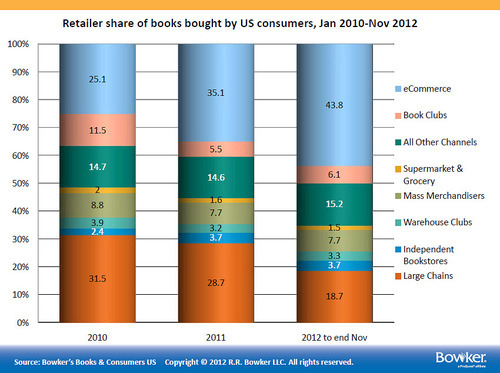If you love books?heck, if you even like ?em?run, don?t walk, and read this magnificent, magisterial essay by Richard Nash on their past, present and future. It?s long. Don?t be frightened. But even if the Internet has shredded your attention span, at least scroll down to its epic final paragraph. Go on. I?ll wait.
It?s been a rotten decade for book publishers, newspapers, and anyone else clinging to that 15th century technology called the printing press. Marc Andreessen has advised the mighty New York Times to ?burn the boats? and shut down their presses. His partner Ben Horowitz claimed last year that ?babies born today will probably never read anything in print.?
Meanwhile, Borders is dead, the tablet is killing the e-reader, and Barnes & Noble?s Nook has gone from investor darling to dead-weight albatross. The ?Big Six? publishers may seem to be surviving nicely, but check out this graph:

If publishers are at war with Amazon, the undisputed king of e-commerce?and they certainly think they are?then that remarkable trend does not bode well for them.
Authors aren?t doing so well either. ?For large parts of the year it only takes a few hundred copies a day, not a few thousand, to get to the top of Amazon?s daily charts.? ?My novel shot to the top of the site?s bestseller list last summer. You won?t believe how little I got paid.?
Nowadays, when authors dream of financial success, they dream more of Hollywood or TV adaptations than slots on the New York Times bestseller list. Movies and television have held up remarkably well under the onslaught of the Internet, thanks largely to ever-more-lucrative foreign markets, while book publishing has quietly become far more hit-and-miss than Hollywood. Last year each book in E.L. James? Fifty Shades Of Grey trilogy sold more than 15 million e-book copies. Only one other book, Gillian Flynn?s Gone Girl, broke a million. Which is more than it sold in print, incidentally.
For the last five years, in the face of this spreading transformation, the publishing industry has been caught in a tawdry and depressing spiral of denial and decay, constantly attempting to reject new media, new technologies, and new business models until they can fight back no more. (Disagree? Name some publisher-driven innovations.) Evan Hughes? recent Wired piece is the latest in a long line of eulogies. If it seems incredibly musty and tired to you, you?re not alone. I?m faintly amazed that it was published in Wired in 2013; my own contribution to the genre dates back to 2007.
That?s why Nash?s essay is such a breath of revolutionary air. The publishing industry will never be the same, but why can?t it be better? Why can?t a whole new model of publishing be created, rather than this false dichotomy between ?published? and ?self-published?? So the king is dying; well, long live the king!
The Internet opens up new ways of connecting with readers that authors have never dreamed of before? and that publishers seem to barely even consider. Take Wattpad. A few months ago they put a couple of my novels up on their site for free. (They did ask permission, even though they didn?t need to; after the rights to the books in question had reverted from their initial publishers, I released them under a Creative Commons license.)
And I?m delighted that they did. A cool million chapter-views of my back-catalog hacker thriller Invisible Armies later, I know far more about how people read the book than I ever did before:
Hughes seems to be arguing that authors will choose to self-publish. Charles Stross disagrees:
Yes, I could do it. But it?d suck up a huge amount of time I would prefer to spend doing what I enjoy (writing) and force me to do stuff I do not enjoy (reading contracts, accounting, managing other people). The only sane way to do it would be to hire someone else to do all the boring crap on my behalf. And do you know what we call people who do that? We call them publishers.
Indeed. But wait: why do all of those people have to work under the same corporate aegis? Why can?t Stross hire a separate editor, copy editor, publisher and marketer? Why must their end-product be viewed as a thing that is complete and engraved in stone, rather than a living beast amenable to A/B testing and weeks-to-months of optimization, like a Broadway play in previews? If a book isn?t a sheaf of papers any more?and given that the bestselling e-books are now outselling the sheaves, it clearly isn?t?then what is it?
I?ll take a swing at that one: a book is a story told in the size and shape that fits most deeply and tightly into the human brain. Everyone keeps waiting for Amazon Singles and short stories to take off, and waiting, and waiting. But I believe novels will remain the dominant form of written storytelling so long as our brains remain substantially unchanged.
Maybe the existing system of publishers and booksellers will collapse. Maybe our collective ability to filter the good from the bad will be challenged. Maybe, as more and more books are written, and more and more made available for free, full-time authors will become an endangered species.
Doesn?t really matter. Books will remain, and because they?re books, because they?re that razor-barbed size and shape, they?ll remain a genuinely powerful and subversive medium. Richard Nash is right: whatever tidal wave of change comes next, whatever economic system or sociopolitical order, you can bet that books, in one form or another, will be at its disruptive heart.
Image credit: Booksplosion, by azrasta, on Flickr.
Source: http://techcrunch.com/2013/03/23/the-business-of-literature-is-blowing-shit-up/
Stevie J mothers day 2012 cinco de mayo osama bin laden death spinal muscular atrophy brooklyn nets may day protests
কোন মন্তব্য নেই:
একটি মন্তব্য পোস্ট করুন